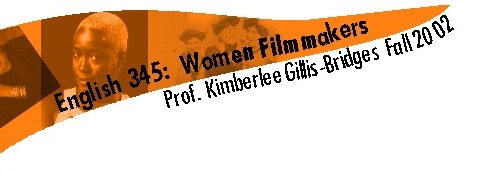


| Course M, 2:30-5:20 W, 2:30-4:20 Thomson 125 |
| Instructor K. Gillis-Bridges Padelford A305 543-4892 MW, 1:00-2:20 |
| Page last updated 11/14/02 |

Grading Criteria for Profiles
A 120- to 150-point Profile (A Range)
- Has a substantive thesis and fully analyzes at least three of the director’s films; the thesis focuses on the significance of the films’ commonalities and presents an argument that is defendable, clearly explained, and supported by the analysis
- Shows substantial depth, fullness and complexity of thought
- Contains sufficient background on the director, offering significant life/career details; profile focuses on analysis of films
- Expresses ideas clearly and commands the reader’s attention
- Demonstrates clear, unified and coherent organization
- Is fully developed and detailed with arguments supported by persuasive reasoning and references to films and sources; there is an appropriate balance between providing evidence and analyzing that evidence
- Has a sophisticated style (remarkable variety of sentence pattern, smooth transitions between ideas, superior control of diction)
- Incorporates research, citing a minimum of four sources
- Offers clear citation of all ideas and words not the author’s own
- Has few, if any, minor errors in grammar, usage or mechanics
- Has a clear thesis and profile analyzes commonalities in at least three films, but thesis and profile may not fully address the significance of the films’ connections; the thesis may be clear and well-argued, but could use additional support throughout the profile; or the thesis may be identifiable, but not sharply focused
- Shows some depth and complexity of thought
- Contains background on the director, but may offer some superlative life/career details; background may detract from analysis of films
- Expresses ideas clearly
- Demonstrates effective organization
- Is well developed with sensible reasoning and appropriate references to films and sources; however, some evidence may detract from the thesis and some ideas might not be fully explored.
- Demonstrates balance between evidence and analysis for the most part, but balance may be weak in places
- Has an effective style (some variety of sentence patterns, transitions between ideas, accurate diction)
- Incorporates research, citing a minimum of four sources
- Properly cites source material, but may have errors in citation format
- Has few errors in grammar, usage or mechanics
- Has a thesis that may not be entirely clear and profile does not fully analyze commonalities among three or more films; profile may raise many points for analysis but explore few
- Shows insufficient awareness of the complexity of the director and her films; may treat the films simplistically or repetitively
- Contains extensive background details that may overshadow the analysis
- Communicates ideas clearly for the most part, but may have some lapses in clarity
- Has a recognizable organizational pattern, but the relation among parts is not consistently clear enough to provide a coherent focus
- Is unevenly developed; writer may offer sufficient reasoning or references to films and sources for some of the ideas but not for others
- Demonstrates some balance between evidence and analysis
- Has an adequate style (limited variation in sentence patterns, transitions between most ideas, diction accurate for the most part)
- Incorporates research, but cites fewer than four sources
- Cites the majority of source material, but occasionally material may be clearly cited but not referenced in parentheses
- Has some errors in grammar, usage or mechanics, but demonstrates basic control of these areas
- Has an unclear thesis; profile identifies the director, names her films and meets basic length requirements, but does not analyze the films' commonalities in any meaningful fashion
- Lacks focus or demonstrates confused, stereotyped or simplistic thinking; writer may demonstrate no overall conception of the issues raised by the films
- Contains primarily background on the director with little analysis of her films
- May not communicate ideas clearly
- Is ineffectively organized, with no clear relationship between the parts of the profile
- May not provide adequate or appropriate reasoning or references to support generalizations, or may provide details without generalizations
- Demonstrates little relationship between evidence and the thesis
- Has stylistic weaknesses (no variety of sentence patterns, few transitions, imprecise diction)
- Incorporates little research
- Indicates use of source material, but does not have consistent parenthetical references
- Has occasional major errors in grammar, usage or mechanics or frequent minor errors that interfere in the reader's understanding of the profile
- Has no thesis or has an incomprehensible thesis
- May be deliberately off-topic and demonstrate no understanding of the issues addressed by the films
- Does not communicate ideas clearly
- Lacks coherent organization
- Shows no development of ideas; may simply summarize films or offer only biography
- Has an incoherent style (difficulties with sentence structure, pattern of diction errors)
- Incorporates no research
- Presents another writer’s work as the author’s own
- Has pervasive pattern of errors in grammar, usage and mechanics that renders the profile unreadable